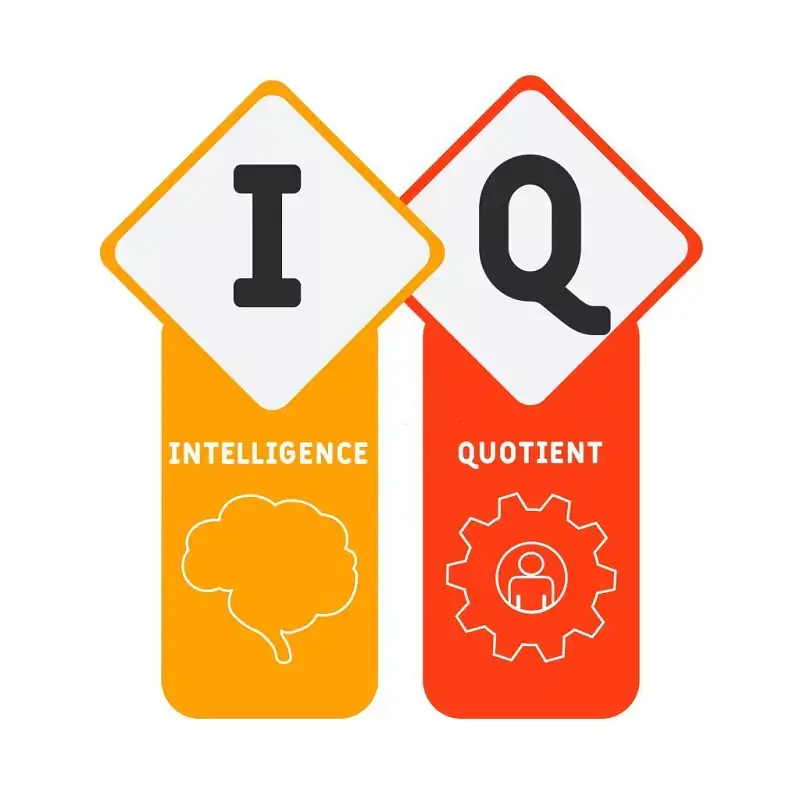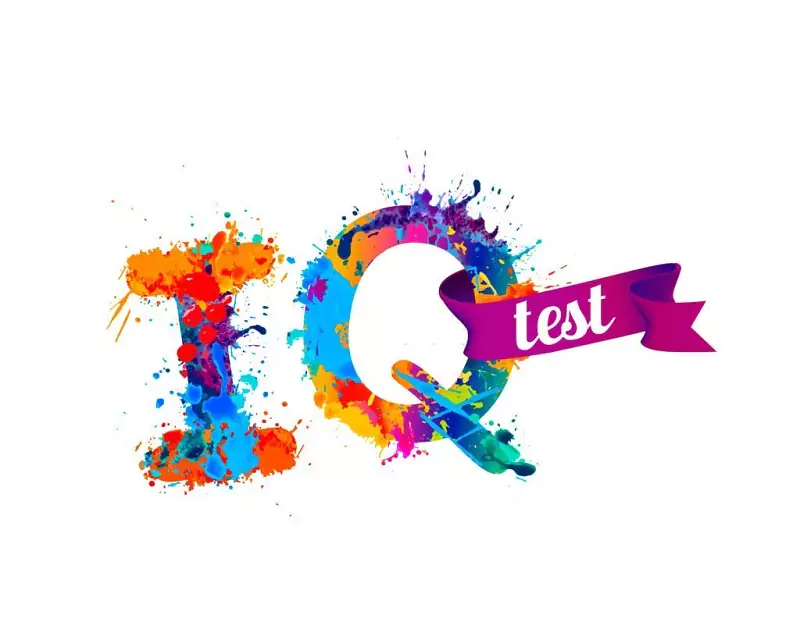Intelligence Quotient
About IQ & Contributors History
IQ Test Classic | Kids | High Range
What Does IQ Stand For? Understanding about IQ Scores
I. What does IQ stand for?
IQ, or Intelligence Quotient, is a measurement of cognitive ability and potential that has been widely used for over a century. It is a score derived from standardized tests designed to assess intelligence, and is used to predict academic and career success.

Many cognitive skills, such as verbal and spatial reasoning, problem-solving, and memory, are typically measured by IQ tests. The performance of a person on the test is contrasted with that of a representative sample of the population to determine their score.
While intelligence and success are frequently linked, it's important to remember that IQ is only one method of assessing cognitive ability and may not be a reliable indicator of a person's full range of intellectual strengths and weaknesses. A lot of experts contend that IQ tests shouldn't be used as the only indicator of intelligence because of their limitations and cultural biases.
In summary, IQ is a measure of cognitive ability that has been used for over a century to predict academic and career success. While it can be a useful tool for assessing certain cognitive abilities, it should not be relied upon as the sole measure of intelligence, and its limitations and cultural biases should be taken into account.
II. Understanding IQ Scores: Measurement and Calculation
1. What is a Standardized IQ Test?
A standardized IQ test is a test designed to measure cognitive ability and potential in a standardized and consistent manner. Standardization ensures that each individual is given the same test, under the same conditions, with the same instructions and time limits.
These exams are made to assess a variety of cognitive abilities, such as memory and problem-solving skills, verbal and spatial reasoning, and problem-solving. Standardized IQ tests are norm-referenced, which means that a score of 100 is regarded as average and that a person's score is compared to the scores of a representative sample of the population.
The Stanford-Binet Intelligence Scale, the Kaufman Assessment Battery for Children, and the Wechsler Adult Intelligence Scale are a few examples of standardized IQ tests. These exams are frequently used to evaluate cognitive abilities, forecast academic and professional success, and pinpoint people who might gain from specialized interventions in educational and clinical settings.
2. How is an Individual's IQ Score Calculated?
An individual's IQ score is calculated by comparing their performance on a standardized IQ test to the performance of a representative sample of the population. The IQ score is derived from a combination of the individual's raw test scores and their age.
The standard deviation on most IQ tests is set at 15, with a mean score of 100. Accordingly, the majority of people will have IQs that range from 85 to 115. Scores that are below or above this range signify cognitive abilities that are, respectively, below or above average.

The raw test results of a person are first transformed into standard scores, which represent how well they performed in comparison to the general population, before their IQ score is calculated. The IQ deviation, which varies depending on the IQ test being used, is then added to the average of these standard scores. The result of this calculation is the person's IQ rating.
It's important to remember that while IQ scores can be helpful for evaluating specific cognitive abilities, they shouldn't be used as the only indicator of intelligence and that it's important to consider their limitations and cultural biases. Furthermore, IQ levels are not constant and are subject to change over time, especially during childhood and adolescence.
III. IQ Tests: History and Types
1. The Origins of IQ Testing: A Historical Overview
The early 20th century work of French psychologist Alfred Binet is where the idea of intelligence testing first emerged. In order to identify students in the French educational system who required additional educational support, Binet was tasked with creating a test. His test, which was created to gauge a child's mental age, concentrated on activities like memory, comprehension, and problem-solving.
The Stanford-Binet Intelligence Scale was developed in 1916 after American psychologist Lewis Terman modified Binet's test. The Terman test was standardized for use in the US and quickly rose to the top of the list of intelligence assessments used there.
The American military started using intelligence tests to weed out candidates during World War I. These assessments were also used to assign soldiers to particular tasks based on their cognitive abilities and to identify people who were more likely to succeed in particular military roles.
Tests like the Kaufman Assessment Battery for Children and the Wechsler Adult Intelligence Scale were created for use in educational and clinical settings as the use of IQ testing grew throughout the 20th century. However, there is ongoing discussion about the reliability and applicability of these tests in contemporary society. IQ testing has also come under fire for its cultural biases and limitations.
2. Types of IQ Tests: Exploring the Varieties and Uses
There are many different types of IQ tests that are used for various purposes, and they are all designed to measure a person's cognitive potential and abilities. The most popular IQ test types and their applications are listed below:
- Verbal IQ Tests: These tests focus on verbal abilities such as vocabulary, comprehension, and verbal reasoning. They are often used in educational settings to assess a student's language and communication skills.
- Performance IQ Tests: These tests focus on nonverbal abilities such as spatial reasoning, perceptual organization, and problem-solving. They are often used in clinical settings to assess cognitive abilities in individuals who may have difficulty with verbal tasks.
- Full-Scale IQ Tests: These tests measure overall cognitive ability and potential, and typically include both verbal and performance subtests. They are often used in clinical settings to assess an individual's overall cognitive functioning.
- Culture-Fair IQ Tests: These tests are designed to minimize cultural biases and assess cognitive abilities in individuals from diverse cultural backgrounds. They typically use nonverbal tasks that do not rely on language skills.
- Group IQ Tests: These tests are administered to groups of individuals at the same time and are often used in educational settings to assess the cognitive abilities of a large number of students.
- Individual IQ Tests: These tests are administered one-on-one and are often used in clinical settings to assess cognitive abilities in individuals with specific needs or challenges.
In general, IQ tests can be useful tools for evaluating cognitive potential and abilities, but it's important to keep in mind that they have limitations and cultural biases that should be considered. When interpreting IQ test results, it's crucial to take into account a person's particular strengths and weaknesses as well as their upbringing and cultural background.
IV. The Limitations of IQ: Critiques and Controversies
1. Critiques of IQ Tests: Cultural Bias and Other Limitations
1.1 Criticisms of IQ Exams : Cultural Bias
While IQ tests can provide valuable information about an individual's cognitive abilities and potential, there are several critiques and limitations of these tests that should be taken into account.

One of the primary criticisms of IQ tests is their potential cultural bias. Many IQ tests are developed in Western countries and are based on cultural assumptions and values that may not be universal. For example, some questions on IQ tests may rely heavily on knowledge of specific cultural references or experiences that are not shared by individuals from other cultures. This can result in lower scores for individuals from certain cultural backgrounds, even if they have similar cognitive abilities to individuals from other cultures.
The fact that only a specific subset of intelligence and cognitive abilities are measured by IQ tests is another drawback. IQ tests typically concentrate on cognitive skills like memory, verbal and nonverbal reasoning, and processing speed but do not measure other crucial skills like emotional intelligence, creativity, or practical skills. This implies that IQ scores might not be a reliable indicator of an individual's success in these other areas.
The predictive validity of IQ tests is also constrained. IQ scores are not always reliable indicators of future outcomes, but they can give some insight into a person's potential for academic and professional success. A person's success can be greatly influenced by a variety of elements outside of cognition, such as drive, tenacity, and opportunity.
The misuse of IQ tests and the stigmatization of people with lower scores have also been criticized. Even if they have other strengths and abilities, some people with lower IQs may encounter prejudice and unfavorable stereotypes. It's crucial to keep in mind that IQ results are only one piece of information and shouldn't be used to draw broad conclusions about specific people or groups.
1.2 Other Limitations
In addition to cultural bias, IQ tests also have other limitations. One limitation is that they may not accurately reflect an individual's full range of cognitive abilities or potential. IQ tests typically only measure certain aspects of cognitive functioning, such as verbal and nonverbal abilities, while other important aspects of cognition, such as creativity, emotional intelligence, and practical intelligence, may not be assessed.
Another limitation of IQ tests is that they may not take into account environmental and social factors that can impact cognitive development. Factors such as education, nutrition, and exposure to stress and trauma can all affect an individual's cognitive functioning, but these factors may not be reflected in IQ test results.
Despite these critiques and limitations, IQ tests can still be useful tools for assessing cognitive abilities and potential. However, it's important to interpret IQ test results in conjunction with other factors, such as an individual's unique strengths and weaknesses, cultural background, and environmental and social factors.
2. Controversies Surrounding IQ: Ethical and Political Implications
What IQ stands for is a measure of an individual's cognitive abilities and potential. However, the use of IQ tests has been the subject of many ethical and political controversies.
One of the primary controversies surrounding IQ tests is the potential for misuse and discrimination. Some individuals and groups have used IQ tests as a way to make sweeping generalizations about entire populations or to justify discriminatory policies. This has led to concerns about the fairness and accuracy of IQ tests, particularly in relation to individuals from marginalized communities who may face social and economic barriers that impact their performance on IQ tests.
The potential for cultural bias in IQ tests is another topic of debate. Many of the IQ tests that are created in Western nations are predicated on cultural presumptions and values that might not be shared globally. Even though people from particular cultural backgrounds may possess comparable cognitive abilities to people from other cultures, this can lead to lower test scores for those people.
The heritability of intelligence and the possibility of genetic determinism are other topics of discussion. While some researchers contend that genetics play a significant role in IQ development, others emphasize the importance of environmental factors like education and socioeconomic status. These discussions have significant ramifications for social policy, education, and how people with lower IQs are handled.
All in all, the debates over IQ tests have brought attention to the importance of exercising caution and critical thought when interpreting IQ results. When interpreting IQ test results, it's crucial to take into account a person's particular strengths and weaknesses as well as their cultural and environmental background. Additionally, it's crucial to combine IQ tests with other tests of intelligence and aptitude and to be conscious of the possibility of abuse and discrimination.
V. Beyond IQ: Other Types of Intelligence and Cognitive Abilities
1. Emotional Intelligence: Understanding and Measuring EQ
Emotional intelligence, or EQ, refers to the ability to understand and manage one's own emotions, as well as the emotions of others. Unlike IQ, which measures cognitive abilities such as reasoning and problem-solving, EQ focuses on social and emotional abilities such as empathy, self-awareness, and relationship management.

The four-branch model created by psychologist Daniel Goleman is one of many different emotional intelligence models, but it is also one of the most popular. Self-awareness, self-management, social awareness, and relationship management are the four main tenets of this model. People with high EQ are able to recognize and control their own emotions as well as comprehend others' emotions and effectively react to them.
Since there is no one test or measurement that can fully capture the complexity of emotional intelligence, measuring EQ can be difficult. To measure various EQ traits, researchers have created a variety of self-report measures, behavioral evaluations, and performance-based tasks.
According to research, people with high EQ typically have better career success, more satisfying relationships, and better mental health outcomes. Additionally, research has shown that EQ is a more accurate predictor of leadership potential and job performance than IQ.
Understanding and measuring EQ is an important area of research that can have important implications for personal and professional success. By developing our emotional intelligence, we can improve our relationships, manage stress and conflict more effectively, and achieve greater overall well-being.
2. A Look at Howard Gardner's Theory
Howard Gardner's theory of multiple intelligences proposes that traditional measures of intelligence such as IQ may not fully capture the range of abilities that individuals possess. Gardner identified eight different types of intelligence: linguistic, logical-mathematical, spatial, bodily-kinesthetic, musical, interpersonal, intrapersonal, and naturalistic. These different types of intelligence reflect a different way of thinking and learning and individuals have different strengths and abilities across these types.
Gardner's theory has been widely influential in the fields of education and psychology, recognizing and valuing different types of intelligence can help individuals develop their strengths and abilities across a range of domains. However, the theory has been criticized for being too broad and vague to be useful in practice, and some researchers question the empirical evidence for the theory.
Despite these debates, Gardner's theory of multiple intelligences remains an important and influential concept in the study of intelligence and learning. It recognizes the diversity of human abilities and strengths and suggests that traditional measures of intelligence may not be enough to fully capture an individual's abilities. Educators and researchers can use this theory to help individuals develop their full potential across a range of domains and contexts.
VI. The Role of IQ in Modern Society
Intelligence quotient has been a crucial idea in contemporary society, influencing many facets of our lives, including education, employment, and social standing. In the past, IQ tests were frequently used as the main method of assessing intelligence and were thought to be a good indicator of future success. However, due to worries about cultural bias and other limitations, the use of IQ tests in contemporary society has come under increasing scrutiny.
Despite these limitations, IQ continues to play a significant role in modern society, particularly in areas such as education and employment. In education, IQ tests are still used to identify students who may require additional support or gifted students who require advanced learning opportunities. In the workplace, IQ tests are sometimes used as part of the hiring process to assess an individual's problem-solving skills and ability to learn new tasks quickly.
However, the use of IQ tests in these contexts has also been criticized for perpetuating inequalities and discrimination, particularly against minority groups who may score lower on IQ tests due to cultural or socioeconomic factors. Additionally, the concept of intelligence has evolved beyond just IQ, with other types of intelligence such as emotional intelligence and multiple intelligences gaining recognition.
In conclusion, while IQ continues to have a role in modern society, it is important to acknowledge its limitations and recognize the value of other types of intelligence. As we continue to develop our understanding of intelligence and its role in society, we must strive to use assessments that are fair, unbiased, and inclusive to ensure that everyone has an equal opportunity to reach their full potential.
VII. Facts about What IQ stand for people might not know
Here are some intriguing IQ facts that you may not be aware of:
- IQ tests were initially designed to identify students who needed extra help in school, not to measure overall intelligence.
- The average IQ score is around 100, with scores ranging from 70 to 130 being considered within the normal range.
- IQ scores can change over time, particularly during childhood and adolescence, as the brain continues to develop.
- There is no single "IQ gene" that determines intelligence; rather, intelligence is believed to be influenced by a complex interplay of genetic and environmental factors.
- IQ scores have been found to be correlated with a wide range of life outcomes, including educational and occupational success, income, and even health and longevity.
- Despite its widespread use, IQ testing remains a controversial and debated topic, with critics arguing that the tests are culturally biased or fail to capture other important aspects of intelligence.
- Intelligence is not the only predictor of success or achievement, and individuals with lower IQ scores can still achieve great things through hard work, determination, and other skills and abilities.
- IQ scores are not fixed and can change over time, particularly during childhood and adolescence.
- While IQ can be a useful tool for assessing cognitive abilities, it should not be seen as the sole determinant of a person's intelligence or potential.
- There are a variety of different types of IQ tests, including verbal IQ tests, performance IQ tests, and culture-fair IQ tests.
Even though IQ is still a significant and influential concept in contemporary society, it is important to be aware of its limitations and to keep researching other aspects of human ability and intelligence.
